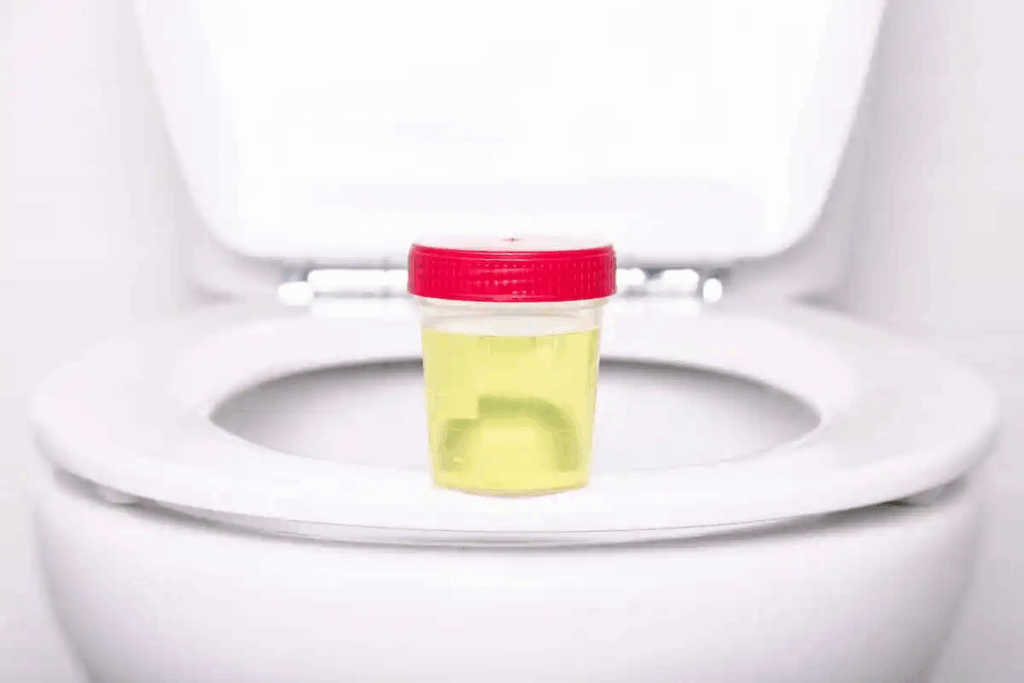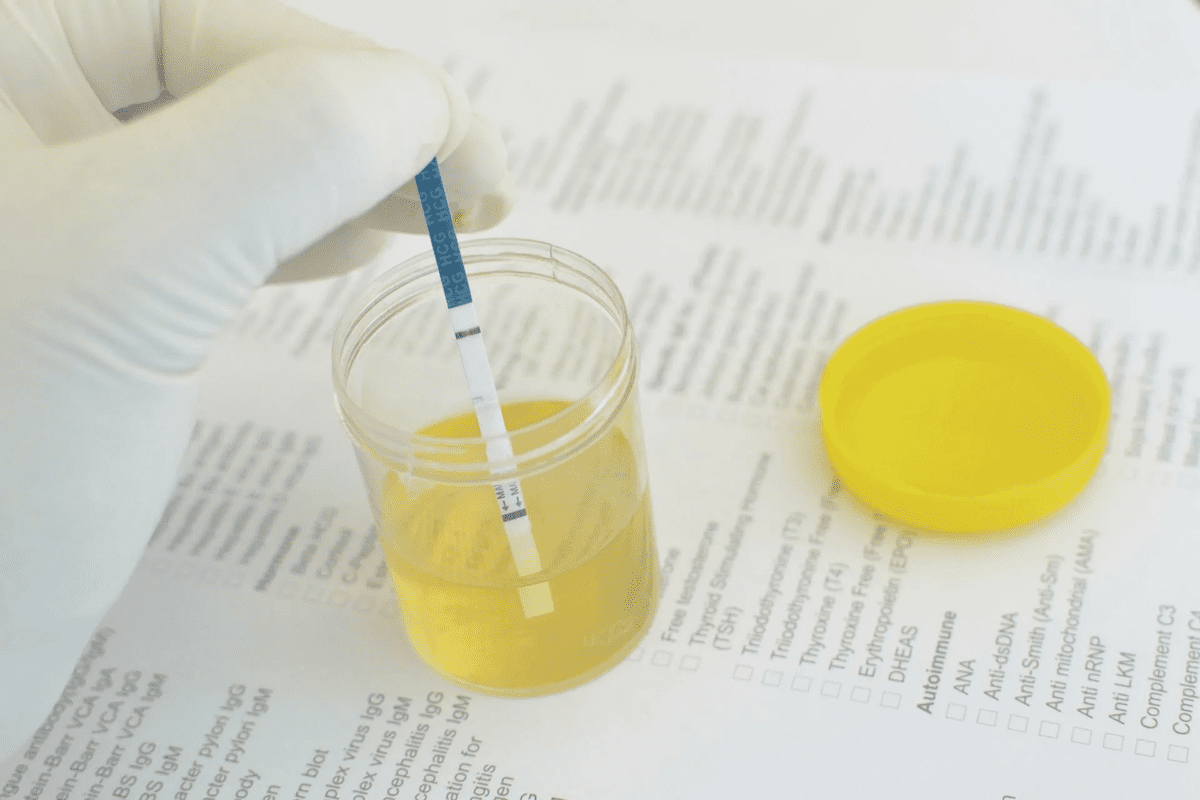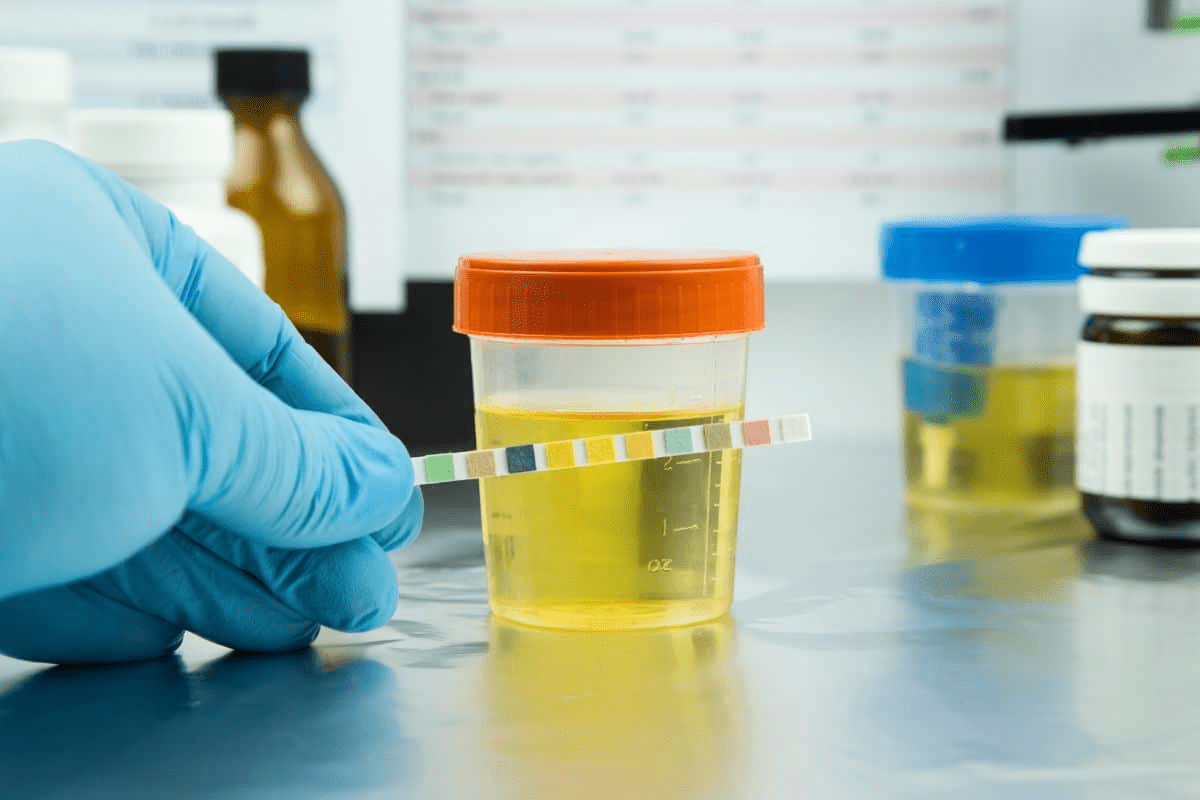Last Updated on October 31, 2025 by

Uric acid kidney stones are a big problem, affecting millions globally. Nearly two-thirds of these cases can be prevented with the right lifestyle and diet changes. If you have high uric acid levels, gout, diabetes, or obesity, knowing how to stop these stones is key to keeping your kidneys healthy.
We will look at five strategies backed by doctors to stop uric acid kidney stones before they occur. By using these methods, you can keep your kidneys in top shape and lower the chance of getting these painful stones.
Can high uric acid cause kidney stones? Learn the definitive link and 5 effective strategies to lower your risk through diet and medication.

Uric acid kidney stones form when the body’s uric acid levels get out of balance. These stones are more common in men and older populations. They make up about 8-10% of all kidney stones. To understand how they form, we must look at the factors that lead to their development.
Uric acid stones, or urate stones, form in very acidic urine. This acidity, along with high uric acid levels in the urine, helps uric acid crystals form into stones. This condition is called hyperuricemia. It’s a major factor in the formation of these stones.
Research shows that uric acid stones are more common in certain groups. Men are more likely than women to get them, and the risk grows with age. Diet, how much we drink, and health conditions also play a big role in their formation. Knowing these demographics and risk factors is key to preventing and treating them.
By understanding the characteristics and risk factors of uric acid kidney stones, we can improve prevention and treatment. This knowledge helps us focus on those most at risk. It also helps reduce the number of these painful stones.

High uric acid levels can raise the risk of kidney stones. These stones are painful and affect many people. We’ll look at how uric acid and kidney stones are connected, focusing on important factors.
Uric acid stones form when there’s too much uric acid in the urine. This can lead to crystals forming stones. Several factors, like low urine pH and low urine volume, play a role.
Key factors in uric acid stone formation:
Acidic urine can cause uric acid crystals to form stones. Also, not drinking enough water can make urine too concentrated, raising the risk of stones.
High uric acid levels in the blood increase the risk of uric acid stones. This can happen due to genetics, diet, or conditions like diabetes and obesity.
Condition | Effect on Uric Acid Levels |
Diabetes Mellitus | Increases uric acid levels |
Obesity | Associated with higher uric acid levels |
The pH of urine is key in forming uric acid stones. A low pH increases the risk by helping uric acid crystals form.
Keeping urine pH balanced is vital to prevent stones. Eating foods and taking supplements that make urine more alkaline can help manage uric acid levels and lower stone risk.
Uric acid kidney stones form due to medical, demographic, and dietary factors. Knowing these risks helps in preventing and managing them.
Some medical conditions raise the risk of uric acid kidney stones. These include:
Demographic and lifestyle factors also affect the risk of uric acid kidney stones.
Demographic Factor | Risk Level |
Men aged 40-60 | High |
Postmenopausal Women | Moderate |
Sedentary Lifestyle | High |
Diet is key in the formation of uric acid kidney stones. Important dietary contributors include:
Understanding these risk factors helps individuals prevent uric acid kidney stones through lifestyle changes and medical management.
It’s important to know the signs of uric acid stones to get medical help fast. If not treated quickly, these stones can cause serious health problems.
The symptoms of uric acid stones can differ, but some common ones are:
These signs can also be seen in other types of kidney stones. But, uric acid stones have unique features.
Uric acid stones are different from other kidney stones. They form in people with:
Knowing these differences helps doctors diagnose and treat them correctly.
To find out if you have uric acid stones, your doctor might suggest:
Most uric acid kidney stones can be treated with medicine. This medicine makes your urine more alkaline and increases its volume. It also lowers uric acid levels. Early treatment can greatly improve your health.
Drinking enough water is key to avoiding uric acid kidney stones. It helps dilute your urine, making it less likely for stones to form.
To prevent uric acid kidney stones, knowing how much fluid you need is important. Aim for 8-10 glasses of fluid a day, with water being the best choice. But, your needs can change based on your climate, how active you are, and your health.
Check your urine color to see if you’re drinking enough. If it’s pale yellow or clear, you’re good. But, if it’s dark yellow or amber, you might need more water.
While water is best, other fluids can also help. Citrate-rich beverages like orange juice or lemonade are great because they help prevent stones.
Try to avoid drinks that can increase your risk of stones, like sugary or caffeinated ones.
Creating a hydration routine can help. Drink a glass of water at set times, like when you wake up, eat, and before/after exercising.
Here are some hydration tips:
By staying hydrated, you can lower your risk of getting uric acid kidney stones. Just remember to drink fluids regularly all day.
To stop uric acid kidney stones, eating less purine is key. A diet low in purine can lower uric acid in your urine. This helps prevent stones. We’ll show you which foods to cut down on, suggest better choices, and offer meal ideas.
Some foods have a lot of purines, raising uric acid levels. It’s smart to eat less of these to avoid stones.
It’s important to keep your diet balanced while cutting down on high-purine foods. Here are some good alternatives:
Here’s a meal plan with low-purine foods:
Meal | Food |
Breakfast | Oatmeal with milk and banana |
Lunch | Grilled chicken salad with vegetables |
Dinner | Baked cod with quinoa and steamed broccoli |
By choosing low-purine foods, you can lower your risk of uric acid kidney stones.
Urinary pH is key in preventing uric acid stones. Uric acid stones form more easily in acidic urine. So, making urine more alkaline can stop these stones.
Urinary pH shows if urine is acidic or alkaline. A pH under 7 is acidic, and above 7 is alkaline. Uric acid stones often form in acidic urine, below 5.5 pH.
Keeping urine pH between 6.0 and 6.5 can lower the risk of these stones.
Eating certain foods can raise urine pH. Foods like oranges, lemons, melons, and spinach can help. Also, supplements like potassium citrate can alkalize urine.
But, diet changes alone might not be enough. Sometimes, supplements are needed. Always get advice from a healthcare professional before starting supplements.
Testing urine pH at home can show how diet changes affect acidity. You can buy pH test strips to check regularly. This helps adjust your diet and treatment plan.
Tracking pH levels can also reveal patterns and triggers. This proactive approach can greatly reduce the risk of uric acid stones.
Managing weight and metabolic conditions is key to preventing uric acid kidney stones. Obesity and diabetes are big risks for these stones. Fixing these issues can lower the chance of stones forming.
Studies show a strong link between obesity, diabetes, and uric acid stones. People with obesity or diabetes often have high uric acid levels. This increases their risk of getting uric acid stones.
Metabolic syndrome, linked to obesity and diabetes, also plays a role. It causes insulin resistance and more uric acid. Treating these conditions is vital to stop uric acid stones.
Effective weight management includes diet, exercise, and sometimes medicine. Eating a balanced diet low in purines and high in fruits and whole grains helps. It keeps you at a healthy weight.
For those with diabetes, controlling blood sugar is key to avoiding uric acid stones. This can be done with medicine, diet, and blood sugar checks.
Key strategies include:
Exercise helps with weight and blood sugar control and directly prevents uric acid stones. It makes your urine less likely to form stones.
Recommended exercises include:
Almost two-thirds of uric acid kidney stones can be dissolved with medical therapies. This shows how important medication options are. For those who often get these stones, knowing about these options is key to preventing them.
There are several prescription drugs to stop uric acid stones from coming back. Allopurinol is one, it lowers uric acid in the body. Febuxostat is another, it also cuts down uric acid levels. These are good for people with high uric acid in their blood.
Medication | Mechanism of Action | Primary Use |
Allopurinol | Reduces uric acid production | Hyperuricemia, Uric Acid Stones |
Febuxostat | Lowers uric acid levels | Hyperuricemia, Uric Acid Stones |
There are also over-the-counter options and supplements to help prevent uric acid stones. Potassium citrate supplements, for example, make urine less acidic. This can lower the chance of stones forming. Always talk to a doctor before starting any new supplements to make sure they’re safe for you.
Managing your medications well is key to stopping uric acid stones from coming back. It’s important to work closely with your doctor to find the right medication for you. Regular check-ups and monitoring of uric acid levels and kidney function are also important. This helps adjust medications as needed to keep you safe.
By using the right medications, people can greatly lower their risk of getting uric acid kidney stones. It’s a big part of a complete prevention plan that includes diet, staying hydrated, and making lifestyle changes.
Creating a plan to prevent uric acid kidney stones is key. By using the strategies from this article, we can make a strong plan. This plan helps us avoid these painful stones.
Drinking enough water, eating less high-purine foods, and managing health issues are important. These steps help lower the chance of getting these stones. They also help keep our urine healthy.
Working with doctors and using these tips daily helps us make a plan just for us. This plan helps prevent stones and keeps our kidneys healthy. It’s a way to take care of our health and avoid future problems, making life better.
Uric acid kidney stones form when there’s too much uric acid in your urine. They can happen due to not drinking enough water, what you eat, and some health issues.
To stop uric acid kidney stones, drink plenty of water, eat a low-purine diet, keep your urine pH balanced, manage your weight, and talk to your doctor about medicine.
Drinking enough water is key to avoiding uric acid kidney stones. It helps spread out the uric acid in your urine, making it less likely to form stones.
To avoid uric acid kidney stones, cut down on foods high in purines like organ meats and some seafood. Choose foods low in purines like fruits, veggies, and whole grains instead.
Yes, your urine’s pH is very important in preventing uric acid kidney stones. A low pH increases the risk, but a healthy pH helps prevent stones.
Keeping a healthy weight through diet and exercise can help prevent uric acid kidney stones. Work with a doctor to create a weight loss plan that’s right for you.
Yes, there are medicines that can help prevent uric acid kidney stones. These include prescription drugs, over-the-counter options, and supplements. Always talk to a doctor about what’s best for you.
You can check your urine pH at home with pH test strips or a pH meter. A doctor can help you find the best way to do this.
Being overweight or having diabetes can increase your risk of getting uric acid kidney stones. Keeping a healthy weight and controlling your blood sugar can help lower this risk.
Yes, making changes like drinking more water, eating a low-purine diet, and managing your weight can help prevent uric acid kidney stones.
National Center for Biotechnology Information. (2025). How to Prevent Uric Acid Kidney Stones 5. Retrieved from https://www.ncbi.nlm.nih.gov/books/NBK560726/
Subscribe to our e-newsletter to stay informed about the latest innovations in the world of health and exclusive offers!